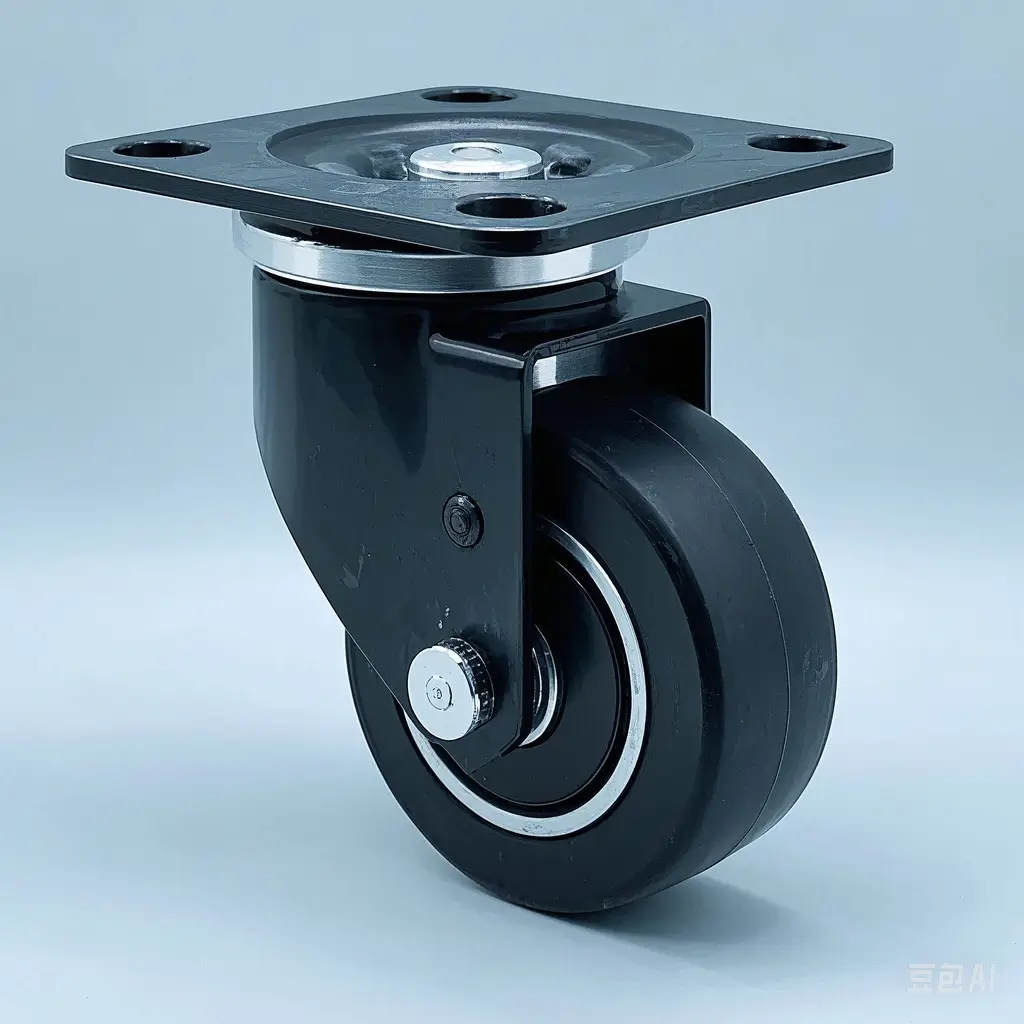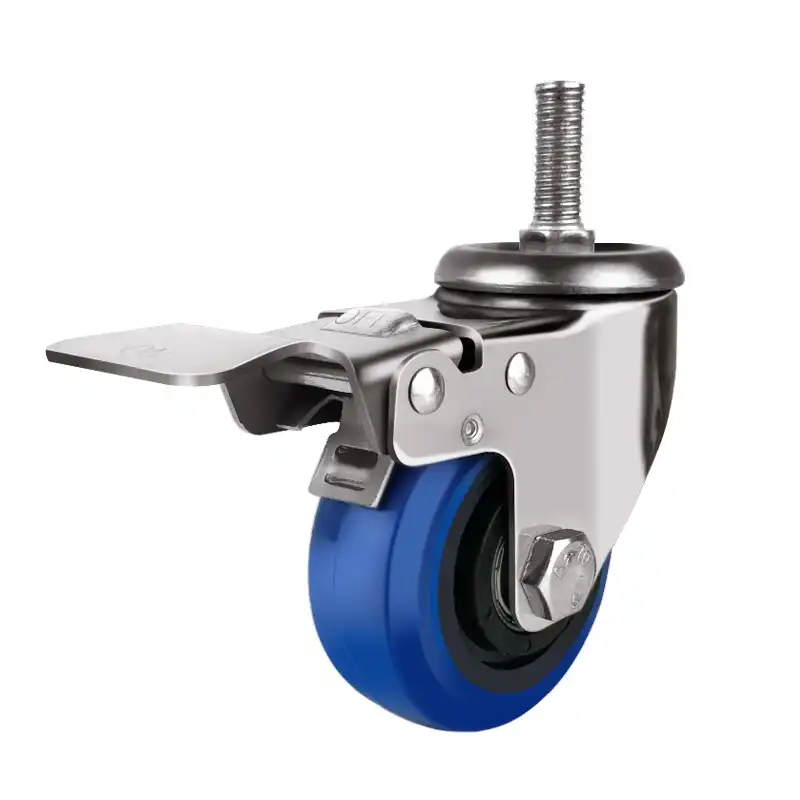Non Marking Caster Wheels vs. Regular Casters: What You Need to Know
When choosing caster wheels, there are many options to consider. It can be a bit overwhelming at times. Two of the most common types are Non Marking Caster Wheels and Regular Casters. Both perform the same basic function — making it easier to move heavy items like furniture or equipment. However, they are not interchangeable. Key differences can greatly affect their performance, depending on your environment and the type of flooring you have.
Material and Construction Differences
The main difference between Non Marking Caster Wheels and Regular Casters is the material and construction. Non-Marking Casters are designed to leave no marks or streaks on floors. This makes them ideal for spaces where floor appearance matters, such as offices, hospitals, or retail environments. They are perfect for moving office chairs, medical equipment, or display racks without leaving scuff marks, even after heavy use.
On the other hand, Regular Casters are often made from harder materials like metal or plastic. These can leave visible marks, especially on delicate floors like hardwood, tile, or linoleum. While Regular Casters work well in rugged environments like warehouses or factories with concrete floors, they’re less suitable for places where floor aesthetics are important.

Performance on Different Surfaces
But beyond the ability to preserve floors, there are other crucial differences that can affect your decision. For example, Non Marking Caster Wheels tend to be quieter and softer, providing a smoother and more comfortable rolling experience.
Non-Marking Casters are ideal for environments like offices, where noise reduction is important. They help maintain a professional, peaceful atmosphere. Regular Casters, on the other hand, are often noisier. They may not offer the same level of quiet operation, especially on hard or uneven surfaces.
Durability also differs between the two types. Non-Marking Casters are made from specialized materials that handle various pressures. While they protect floors well, they are generally meant for lighter to medium-duty use. Regular Casters, however, come in many options and can support heavier loads, making them better suited for industrial or heavy-duty tasks.
Non Marking Caster Wheels: What Are They?
Non marking caster wheels are designed to protect flooring while improving mobility for various equipment. Unlike traditional casters, they don’t leave visible scuff marks or streaks. Made from advanced materials like polyurethane or elastomers, these wheels prevent floor marks even after long-term use. Their soft yet durable compounds also ensure a smoother, quieter rolling experience.
The Benefits of Non-Marking Casters
The main advantage of non marking caster wheels is their ability to protect floors. This is especially important in environments where cleanliness and aesthetics matter, such as offices, hospitals, hotels, and retail spaces. In places like medical facilities or upscale stores, non-marking casters prevent damage to polished marble, wood, or tile floors, which are expensive and difficult to maintain. With these specialized wheels, you can keep floors looking pristine, even when heavy equipment or furniture is frequently moved.
Regular non swivel caster wheels: What Are They?
Regular casters are the most common type of wheels, offering a reliable and cost-effective solution for many applications. Unlike non-marking casters, they aren’t designed to protect floors, making them less suitable for places where floor appearance matters. These wheels are made from durable materials like plastic, metal, or steel, which allow them to handle heavy loads and tough industrial environments. However, regular casters can leave marks or streaks on smooth, polished floors like wood, tile, or concrete. This can be an issue in offices, hospitals, or retail stores where floor cleanliness and appearance are important.
When to Choose Regular Casters
Despite leaving marks, regular casters can be ideal for some situations. In warehouses or factories, where load-bearing and functionality are key, metal or tough plastic casters are often preferred. These materials can handle heavy-duty use without sacrificing performance. Additionally, the harder materials make regular casters better suited for rough surfaces or environments where floor appearance isn’t a concern, like outdoor areas or garages.
Key Differences Between Non Marking Caster Wheels and Regular Casters
Floor Protection
Non-marking casters are great at protecting floors. They won’t leave stains or scratches on wood, tile, or other surfaces. Regular casters, however, can leave marks, especially on softwood or vinyl floors.
Materials and Durability of non swivel caster wheels
Non marking caster wheels are often made from soft rubber or polyurethane. These materials provide grip, reduce noise, and adapt well to uneven floors. Regular casters are typically made from harder materials like plastic or steel. These are more durable and better for industrial use.
Application Scenarios
Non-marking casters are perfect for environments where floor protection is key. These include offices, hospitals, and homes. They work best on floors that are prone to damage, like wood or tile. Regular casters are ideal for industrial settings, such as warehouses, where load-bearing capacity is more important than floor protection.
Noise Control
Non-marking casters are quieter. This makes them ideal for offices and hospitals. They won’t disturb the environment. Regular casters, however, can be loud, especially on hard floors.
Chemical Resistance
Non-marking casters also handle chemicals better. They resist oils, stains, and harsh chemicals. Regular casters may not perform as well in these environments.
Recommended Applications
Non Marking Caster Wheels
Offices: Non marking caster wheels are the perfect solution for office environments, especially in spaces with hardwood floors or tiles. These wheels help prevent unsightly marks, streaks, or scratches, ensuring that floors stay in pristine condition.
Non-marking casters provide smooth, silent movement, making them ideal for office chairs, desks, and filing cabinets. They help maintain a professional, polished appearance while improving comfort for workers who need to move around regularly.
In homes, non-marking casters are perfect for furniture that needs to be relocated without damaging the floor. Whether it’s a coffee table, bookshelf, or storage unit, these casters allow for easy sliding on hardwood, laminate, or tile floors, preserving their aesthetic.
In medical settings, non-marking casters are essential for maintaining cleanliness and ensuring quiet movement. They are used on medical carts, beds, and IV stands to avoid floor damage and minimize noise. These casters help maintain a calm, sterile environment while offering durability and reliability.
Regular Casters
Warehouses:
Regular casters are an excellent choice for warehouse environments where heavy-duty tasks are a daily necessity. These casters, made from durable materials like metal or hard plastic, are built to handle the weight and stress associated with moving large items, pallets, and equipment. Since warehouses typically have industrial-grade flooring that can withstand wear and tear, regular casters are a practical and cost-effective solution. Their rugged construction ensures they can bear significant loads, making them ideal for use on equipment such as shelving units, pallet jacks, and forklifts. Though they may leave marks on floors, this is usually not a concern in such settings where functionality and load-bearing capacity are the primary considerations.
Logistics Equipment:
In logistics and transportation operations, regular casters are often used on equipment designed for moving heavy goods, including carts, trolleys, and material handling devices. These casters are designed to endure the constant movement and handling of goods, making them highly durable and capable of supporting substantial weight. While floor protection may not be a priority in logistics areas, regular casters excel in providing the strength and stability required to transport goods efficiently across warehouses or distribution centers. Their robust design is perfect for environments where functionality and reliability are key, even if it means sacrificing some floor protection.
Industrial Applications:
Regular casters are ideal for industrial settings where the environment is tough, and equipment needs to perform under extreme conditions. These casters are commonly used on machinery, carts, and other mobile equipment in factories, construction sites, or manufacturing plants. Made from highly durable materials, they are built to withstand the rigors of heavy-duty use, including high-impact conditions, chemical exposure, and varying temperatures. While regular casters might not offer the same floor protection as non-marking casters, their ability to endure harsh environments and carry heavy loads makes them indispensable in industrial applications where reliability and durability are paramount.
Conclusion
Both non marking caster wheels and regular casters have distinct advantages, making them ideal for different situations. Non marking caster wheels are specifically designed to protect floors and provide smooth, quiet movement, making them perfect for environments where aesthetics and noise control are a priority. They are highly recommended for spaces such as offices, homes, hospitals, and laboratories, where maintaining clean, pristine floors is essential.
On the other hand, regular casters excel in heavy-duty applications where durability and load-bearing capacity are crucial. These casters are built to withstand extreme conditions and are often used in warehouses, logistics equipment, and industrial settings. While they may not offer the same floor protection as non-marking casters, their robust construction ensures they can handle heavy loads and tough environments.
Understanding these key differences helps you determine the best caster wheel for your needs. Whether you prioritize floor protection or need a caster for heavy-duty tasks, the right choice will depend on your specific requirements.
If you’re still unsure about which caster wheels are right for you, don’t hesitate to reach out. We are here to assist you in selecting the ideal caster solution for your application!
Faqs for Non Marking Caster Wheels
1. What are non marking caster wheels?
Non marking caster wheels are specially designed to prevent scuff marks or streaks on floors. They are made from materials like polyurethane or elastomers, which are softer and more durable, ensuring smooth and quiet movement without damaging delicate flooring.
2. Why should I choose non marking caster wheels?
Non-marking casters are ideal for environments where floor appearance is important, such as offices, hospitals, or retail spaces. They prevent visible marks on smooth, polished surfaces, maintaining the integrity and aesthetic of the floor.
3. Are non-marking casters suitable for heavy-duty use?
Yes, non marking caster wheels are available in various load capacities. While they are generally designed for lighter to medium-duty use, there are options that can handle heavy-duty applications. It’s essential to choose the right caster for your specific needs.
4. Can non marking caster wheels be used on all floor types?
Non-marking casters work well on most smooth, polished surfaces, such as hardwood, tile, and laminate. However, their performance may vary on very rough or uneven floors. It’s important to consider the flooring type when selecting the right caster wheel.
5. How do non marking caster wheels compare to regular casters?
Non marking caster wheels are designed to protect floor surfaces and provide quieter, smoother movement. Regular casters, while durable and functional, may leave marks on certain floors and are more suited for environments where floor appearance is not a priority.
6. Can non-marking casters be used outdoors?
Non-marking casters are typically best suited for indoor use, especially in environments where floor aesthetics are important. For outdoor use, regular casters or heavy-duty options made from more durable materials may be a better choice.
7. How do I maintain non marking caster wheels?
Maintaining non-marking casters is easy. Regular cleaning of both the wheels and the floor will help prevent buildup of dirt or debris, ensuring smooth movement. Avoid using harsh chemicals that might damage the wheels or the floor surface.
8. Do non marking caster wheels wear out quickly?
3 swivel caster non-marking solid polyurethane wheel are made from durable materials like polyurethane or elastomers, which are designed to withstand long-term use. However, like all caster wheels, they may wear out over time, especially if used in heavy-duty environments. Regular inspection and replacement can help maintain their effectiveness.





